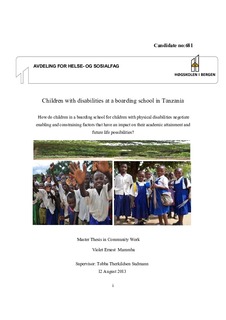Children with disabilities at a boarding school in Tanzania. How do children in a boarding school for children with physical disabilities negotiate enabling and constraining factors that have an impact on their academic attainment and future life possibilities?
Master thesis
Permanent lenke
http://hdl.handle.net/11250/2481873Utgivelsesdato
2013-08-12Metadata
Vis full innførselSamlinger
Sammendrag
Background: Children with disabilities in Tanzania have fewer possibilities for education due to poverty, lack of accessibility and the long distances from their homes to suitable schools. This condition has left them behind in their communities without an education. The majority of those who have reached school age face considerable challenges in securing an education at government or private owned schools compared to their non-disabled peers. The aim of this study is to inquire into how children in a boarding school for children with physical disabilities negotiate enabling and constraining factors that have an impact on their academic attainment and future life possibilities. Theoretical underpinning: The foundation for this thesis lies in the community work assumptions that people have knowledge, competence and the ability to improve their life situation and influence their surroundings. The theories which were selected to serve as torches in illuminating the empirical materials gathered for this study are UNESCO’s Education For All (EFA) and Lifelong Learning strategy, WHO’s international classification of functioning, disability and health, the Children and youth version (ICFCY), participation and agency. Key themes: agency, social interaction and participation, friendship, community, future and being and becoming. The study site is Mafanikio boarding school offering primary education for boys and girls between the ages of 7-20 years. In August 2011, the total of children attending amounted to 206, with the staff split as follows: 11 teachers; 1 nurse, 2 orthopaedics, 1 matron, 1 social service secretary, 1 school director and 10 caretakers. viii Method: The empirical material for the study was gathered through the ethnographic approach, involving observation, formal/informal individual and group interviews with pupils and staff, and participation in everyday living (teaching and tutoring). Findings/knowledge proposals The study found that, through interactions which were influenced by the condition of living together, the children developed different skills and mechanisms that contributed to the enhancement of their everyday lives and learning while at boarding school. Through cooperation and helping each other in activities such as self care and learning, the children discovered their strengths and found ways to help themselves, all important skills for independent living in the future. Also, it was discovered that as the children grew older they tended to perceive education not only as a source of knowledge but also as means to a brighter future. Further research As the condition of living together, the children developed strong feelings of interdependence and togetherness. However, there is a need to find out how this condition may influence the development of common identity such as that of ‘we are disabled’, leading to self segregation.
Beskrivelse
Master Thesis in Community Work
